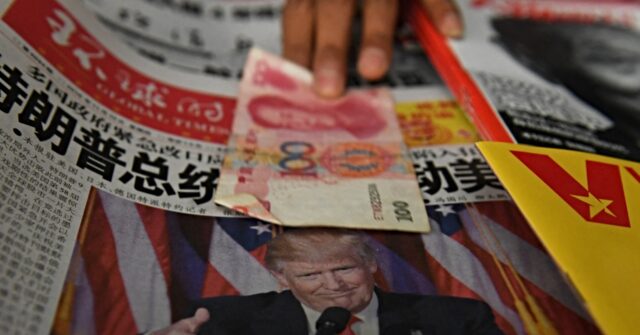Chinese state media outlets have offered very limited English-language commentary on the American presidential election, downplaying the significance of the contest between Vice President Kamala Harris and former President Donald Trump. This reflection mirrors Beijing’s portrayal of the United States as a divided, chaotic, and declining nation. The Chinese Communist Party (CCP) maintains tight control over government and citizen life, consistently producing propaganda that undermines the legitimacy of democratic governance and elections. State media often characterizes American democracy as “low-quality,” suggesting that political plurality leads only to disorder on the global stage and fails to produce the unity essential for effective government.
Ahead of the recent election, China Daily, a state-run newspaper, published a political cartoon illustrating the rivalry between the Democratic and Republican parties through the visual metaphors of a donkey and an elephant struggling to support themselves on lifesavers while the Statue of Liberty sinks in the background. The cartoon insinuated that partisan animosity has overshadowed patriotic unity, underscoring a narrative that much of America is mired in self-destructive conflict. Moreover, the state media highlighted the tense security measures anticipated on Election Day, including the involvement of the National Guard and potential sniper deployments, framing it as a reflection of societal disunity and escalating violence among Americans who view each other as irredeemable.
An article from the state news agency Xinhua criticized both political parties for their inability or unwillingness to tackle pressing issues such as healthcare and crime, noting that both Democrats and Republicans seem blind to the everyday concerns faced by American citizens. It also touched on the fraught political discourse surrounding abortion, describing it as a divisive issue that has deepened societal fractures. This critique came from a regime whose own history includes the promotion of significant reproductive policies under the “one-child policy,” which enforced strict population control measures and resulted in one of the highest abortion rates globally. The CCP’s legacy includes systemic violations of human rights, further complicating its stance on such ethical matters from a position of moral superiority.
Xinhua even resorted to humor, likening the American election to a contentious Thanksgiving dinner where mutual agreement is impossible. Comically depicting both parties as predicting national doom if the other wins, the portrayal suggested that societal divisions will only continue to deepen. Furthermore, columnist Kang Bing from China Daily expressed concern over the deteriorating American public confidence, questioning the extent of political civility marked by candidates resorting to abusive language. He suggested that the stagnation in U.S. public services and living standards over the past four decades reflected broader societal disillusionment and waning global standing.
Despite focusing on the character flaws and faults of American democracy, Kang’s commentary on the election acknowledged that Chinese media coverage of the event was relatively reserved. He suggested that this restraint stemmed from a fear of accusations of interfering in American politics, ironically juxtaposing this notion against increasing evidence of the Chinese Communist Party’s covert attempts to influence U.S. politics. Reports from the Office of the Director of National Intelligence have indicated that China has been actively promoting divisive narratives through social media platforms like TikTok, seeking to undermine faith in American electoral processes.
The intricate web of Chinese influence on American political discourse highlights the CCP’s broader strategy of destabilizing rival nations while promoting its own governance model, which the party erroneously touts as superior. As China continues to grapple with internal issues, such as ethnic genocides and religious persecution, it simultaneously projects an image of growth and vitality that contrasts sharply with its critiques of American democracy. The party’s stance remains one of caution, likely motivated by the awareness that their destabilizing tactics could lead to backlash or increased scrutiny from an already jittery American public and government. Overall, this commentary serves to further entrench the CCP’s narrative, framing U.S. elections as chaotic side shows devoid of real democratic value.

